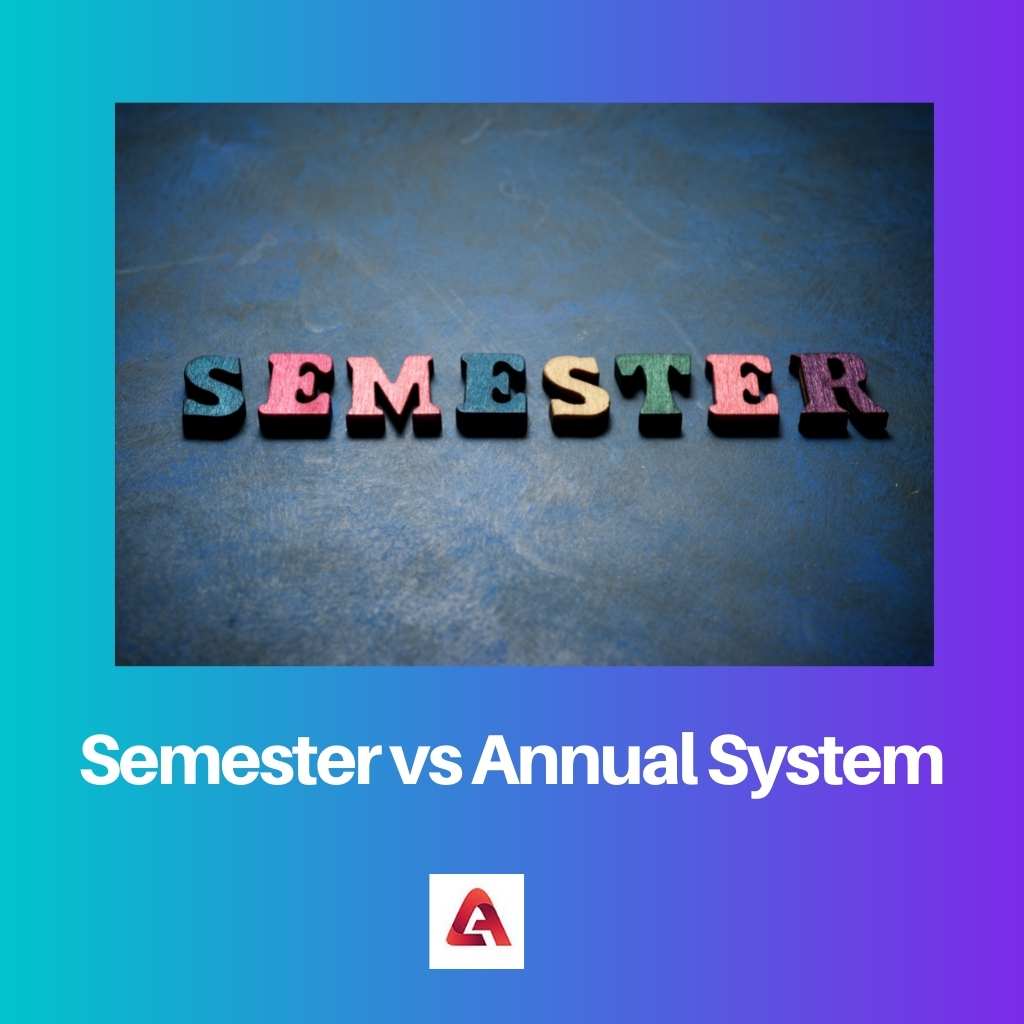Examinations are an important part of analyzing the process of individual students. It helps in determining the student’s level of understanding and involvement in the subject.
When the course is huge, it is good to conduct more than one examination too. Semester and annual systems are two forms of examination policy that have worldwide acceptance.
Key Takeaways
- Academic years are divided into two semesters in the semester system, while in the annual system, academic years are divided into one or two terms.
- The semester system offers more flexibility for students to change courses or take a break, while the annual system provides more continuity and structure.
- The semester system allows for more frequent assessments and feedback, while the annual system has fewer assessments but with more weightage.
Semester vs Annual System
The difference between Semester and Annual System is that Semester is a form of examination that happens every four or six months. On the other hand, the annual system is a type of examination process in which the exam is taken once in a period of twelve months.

Semester exams are the most common type of test. It is known worldwide, and the majority of the universities adopt semester schemes.
It has a lot of factors that make the semester exams better in comparison to the annual system. These are the exams in which the student needs to appear every six months.
The annual system of examination is a little less favourable due to a number of factors. It happens once in a period of twelve months.
This sometimes happens to overburden the student with a huge syllabus and lots of topics to cover for the annual examination that includes every nook and corner of the syllabus.
Comparison Table
| Parameters of Comparison | Semester System | Annual System |
|---|---|---|
| About | It is the system of examination that happens every four or six months. | It is the system of examination that happens every twelve months. |
| Recovery | A student can recover their performance in the even semester and improve their grade. | A student does not have a chance to recover in the annual system. |
| Evaluation | It is better in semester exams. | It is not very great in the annual system. |
| Result | The result is very in-depth and fair. | The result seems a bit superficial. |
| Expenditure | The expenditure is more. | The expenditure is less. |
What is Semester System?
Semester examinations are a very renowned method of conducting exams. This method involves dividing the syllabus into two halves. After this, the two parts of the syllabus are put to the test individually.
In simple words, the students give an exam of the first half of the syllabus after six months of the session. Then the remaining part of the syllabus comes in the second exam, which happens after six months of the first exam.
This means that in the semester policy of taking exams, the students need to appear for the exam twice a year.
This system has both advantages and disadvantages. One of the advantages is that the students get plenty of time to cover their syllabus in detail.
The students get a fair chance to grasp the concepts and take the help of teachers. Since only half syllabus comes in first semester exams, it is easier for teachers to evaluate whether the student understands the subject or not.
On the other hand, a disadvantage of the semester exam is that it costs a lot of money. The expenditure for conducting semester exams becomes almost double of the annual system since it happens twice in twelve months.
What is Annual System?
The annual examination is a very widely known system too. Many universities adopt the annual system in place of semester exams.
A reason for this can be the lower cost of conducting the examination. Since the annual system makes the students appear for exams just once in twelve months, it costs almost half the expenditure that goes in the semesters.
This system also rolls down the work of teachers or evaluators since they only need to evaluator the exams once in twelve months.
However, many comments and debates support the thought that an annual system is not very beneficial for students.
There are many valid points to back this proposition. Firstly, the student needs to learn the whole syllabus at once and then appear for the exam.
This sometimes overburdens the student, and they fail to perform their best. Secondly, since the annual exams are only held once every twelve months, there is no room for improvement without wasting a whole year.
Thirdly, as the question paper needs to include questions from almost all topics of the syllabus, it becomes a bit unfair.
If a student knows a topic nicely but has a problem with a single concept from that chapter that came in the exam, it doubts the potential of the student.
Main Differences Between Semester and Annual System
- The semester examinations conduct every six months, whereas the annual examinations conduct every twelve months.
- It is possible to recover one’s performance in case of semester examinations. On the other hand, no recovery is possible in the annual examination, and the result is final.
- The evaluation and assessment of students are better in semester examination, whereas it is likely to be good in the annual system.
- The results of semester examinations are much better and more explanatory in comparison to the results of the annual system, which are sometimes just superficial.
- The expenditure on semester exams is higher since they happen twice a year, whereas it is less in the case of the annual system as they happen once a year.
